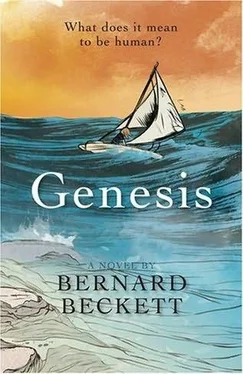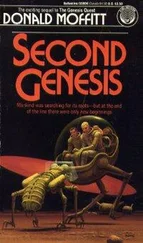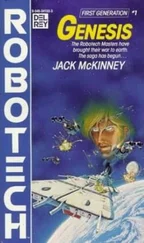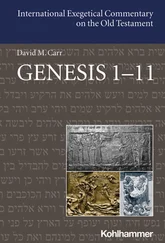In this environment it was a simple matter for The Republic to maintain its structure. People did as they were told because they were working together, focused on a common threat, a shared enemy. But time passes. Fear becomes a memory. Terror becomes routine; it loses its grip.
People were starting to ask questions about The Outside. Others were questioning The Republic itself. There had been protests, murmurings of discontent. Only three weeks before the arrest, a woman had been shot in the street, trying to protect her child from termination.
Most importantly of all, the leaders themselves were being questioned. The promise of The Republic was that the best and the brightest would become Philosophers, and these Philosophers, trained in the art of understanding, would promote wise and enlightened policies from which all the people would benefit. Spectacular promises had been made regarding the Artificial Intelligence program. It was claimed a new breed of thinking robot would save the next generation from the drudgery of labor. The policy, “Your Children Shall Not Be Laborers,” was vigorously promoted but, as is so often true, the greater the promise, the more spectacular the failure.
In 2068, thirteen Soldiers were killed when a prototype excavating robot malfunctioned, and drove its unit over a checkpoint. This led to a new program, where Philosopher William’s model of socialized development rose to prominence. Philosopher William saw the limitations of the feed- back-orientated networks. A radical thinker, he pioneered a new model, which he called chaotic emergence. Under this system, the program itself was written by the learning environment using what we now refer to as the cascade heuristic.
By 2073, the first such model was interacting with Philosopher children in one of the northern nurseries. For six months its development predictably mimicked that of the children it was dealing with. It developed basic language skills, and sufficiently mastered motor control to participate in simple games and activities.
The Republic’s media made much of the advancement, and among the Philosopher class, there was pressure to get their children into the experimental nursery.
EXAMINER: Earlier you told us that The Republic did not allow parents to know their children.
ANAXIMANDER: Nature has a way of exerting itself, and in 2068 a law was passed making the Philosopher class exempt from this deprivation. This may help to explain why some saw the events of the summer of ’74 as a rough sort of justice. The chaotic emergence robot was named Evolution Three. During a simple game of hide and seek — ironically staged for the cameras as part of a promotional flash to support Philosopher William’s bid for the ruling council — it turned on its classmates. Seven children were killed and one tutor seriously injured before the machine was disabled. This meant the end of the research program and, more importantly, was another blow for the Philosopher class and their stewardship of The Republic.
Many historians like to pinpoint Adam as the catalyst for The Republic’s failure, but the truth is The Republic was already failing, and the trial represents The Philosophers’ last attempt to forestall the revolution.
Anaximander checked the time. She was surprised to see how quickly another thirty minutes had passed. This was the material she was most sure of and she knew she was beginning to sound more confident.
EXAMINER: You make a plausible case for The Republic’s decision to prosecute Adam publicly, but their obviously inept tactics at the trial are still considered a puzzle. How did it all go so wrong?
ANAXIMANDER: I am loath to give the answer which I believe to be most true — simply that fate conspired against them.
It is possible, I believe, to be both shrewd and competent, yet still be overrun by circumstance. Again I come back to my main theme. Conspiracy theory fails because it assumes people have within them the means to achieve their ends.
Although the trial undoubtedly failed, I do not think it was because The Republic’s plan was a bad one. In fact, given the situation facing them — falling public support, an increasing laxness in rule and procedure, the smell of revolution in the air — I believe they took the very best course of action. Sometimes, however, even the very best course of action fails.
The problem facing the Council of Philosophers was inevitable. In its beginnings, The Republic had planted the seeds of its own destruction. Plato’s first dictum, which opens The Republican Charter, reads as follows:
It is only in the State that the People may find their full expression. For the People are the State, and the State is the People.
The founders of The Republic sought to deny the individual, and in doing so they ignored a simple truth.
The only thing binding individuals together is ideas. Ideas mutate, and spread; they change their hosts as much as their hosts change them.
The founders believed that by removing the child from the family and the partners from each other, they could break down the usual loyalties, and replace them with loyalty toward the state. But there were many unintended effects. The people were forced to live in large single sex communes. They ate, played, slept and worked together; and they talked to one another. The Republic had established an incubator for new ideas. Although The Republic could control the information pumped into the communes, it could not control the way information changed shape inside the heads of the women and men that it visited.
Plato was an old man by this stage, and Helena was dead. Plato’s lieutenant, a woman who went by the name of Aristotle, was clearly making the decisions. Her personal notes, logged regularly throughout this period, show that she was well aware of the ideas that were taking hold. In one memo to Plato, dating four months before Adam’s trial, she wrote:
We wish for the people to serve the state above themselves, but we have been slow to realise the limits of this equation. Even the tamest animal will turn sour if we neglect its needs. The people no longer believe in the threat, which once hovered over them, and they have grown used to the level of sustenance with which they are provided. They have become complacent and their thoughts have turned to other things. There is a whisper in the communes. It is a living thing: twisting and growing but hiding itself from view. The people are talking of choice, of opportunity, and of freedom. The people are talking of changing their world.
This speaks clearly of the challenge the Council faced. It was a challenge they would never overcome, but they had to try.
Their plan in going to trial was to put a new threat before the people. They sought to fabricate evidence so that Adam could be painted as part of a broader conspiracy.
They wished to unsettle the people, have them believe the plague had mutated to a more virulent form, and that this breach was not the first. They wanted to suggest the Outsiders were already among them, plotting a large-scale invasion.
In short, they wished to return the people to the level of concern and insecurity that had underpinned the establishment of The Republic. “Change Equals Decay,” the second dictum. Adam’s profile made him the perfect candidate. There had been troubles in his past; he was known to be a loner, unconnected and rebellious. The leaders made the mistake of perspective. They assumed that because he represented all they feared, the people would also fear him. They didn’t anticipate his charm. They didn’t anticipate the people making a hero of him.
The trials were screened in every commune. The people became obsessed with the proceedings just as the Council had hoped, but their opinions soon diverged from the official script.
Читать дальше












